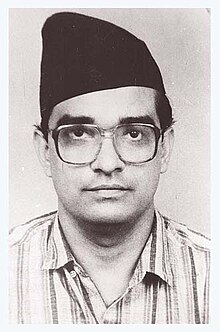Madan Kumar Bhandari | |
|---|---|
मदन कुमार भण्डारी | |
 Madan Bhandari | |
| Personal details | |
| Born | 27 June 1951 Dhungesangu Village, Taplejung, Nepal |
| Died | 16 May 1993 (aged 41) Dasdhunga, Chitwan, Nepal |
| Cause of death | Possibly murdered (car accident) |
| Resting place | Arya Ghat, Pashupati |
| Citizenship | Nepali |
| Political party | Communist Party of Nepal (Unified Marxist-Leninist) |
| Spouse | Bidya Devi Bhandari |
| Children | 2 |
| Known for | जनताको बहुदलीय जनवाद "People's Multiparty Democracy" |
| Awards | Nepal Ratna (2016) |
Preview warning: Page using Template:Infobox officeholder with unknown parameter "movement"
Preview warning: Page using Template:Infobox officeholder with unknown parameter "other_names"
Preview warning: Page using Template:Infobox officeholder with unknown parameter "notable_works"
Preview warning: Page using Template:Infobox officeholder with unknown parameter "monuments"
Preview warning: Page using Template:Infobox officeholder with unknown parameter "opponents"
Preview warning: Page using Template:Infobox officeholder with unknown parameter "body_discovered"
Nepal Ratna Man Padavi Madan Kumar Bhandari (Nepali: मदन कुमार भण्डारी) (27 June 1951[1] – 17 May 1993[2]), commonly known as Madan Bhandari, was a popular[3] Nepali political leader belonging to the Communist Party of Nepal (Unified Marxist–Leninist), a democratic communist party in Nepal.[4] He defeated the incumbent Prime Minister Krishna Prasad Bhattarai in a landslide victory in the 1991 general election. Known for his charismatic style, Bhandari propounded the popular communist principle or thought "People's Multiparty Democracy" (Nepali: जनताको बहुदलीय जनवाद). He is widely regarded for peaking the Nepal's communist movement to a greater height. He died in a jeep accident in Dasdhunga, Chitwan, in 1993.[5][6]
- ^ K.C., Surendra. Aitihasik dastavej sangroh - bhag 2. Kathmandu: Pairavi Prakashan, 2063 B.S.. p 464.
- ^ Publications, Europa (2 September 2003). A Political Chronology of Central, South and East Asia. Routledge. ISBN 978-1-135-35680-4.
- ^ Chhetri, Ag (21 May 2004). "Remembering Madan Bandari".
- ^ SATP (22 May 2018). "Nepal: Decisive Turn – Analysis". Eurasia Review. Retrieved 5 January 2019.
- ^ "Inability to bring out truth behind Madan Bhandari's death painful, says president". The Himalayan Times. 31 March 2018. Retrieved 5 January 2019.
- ^ Cite error: The named reference
Maoistswas invoked but never defined (see the help page).